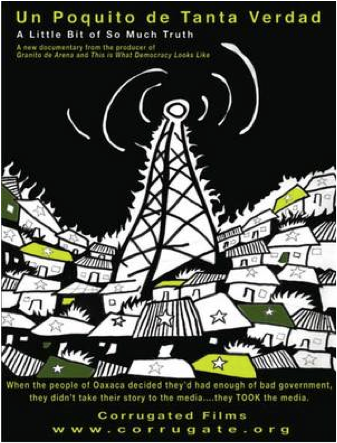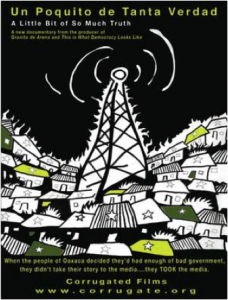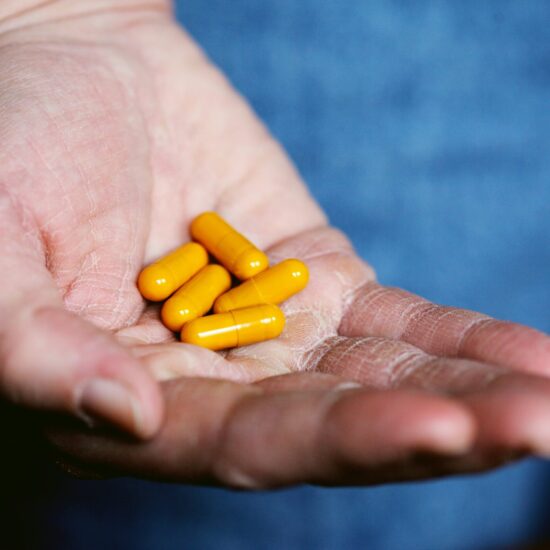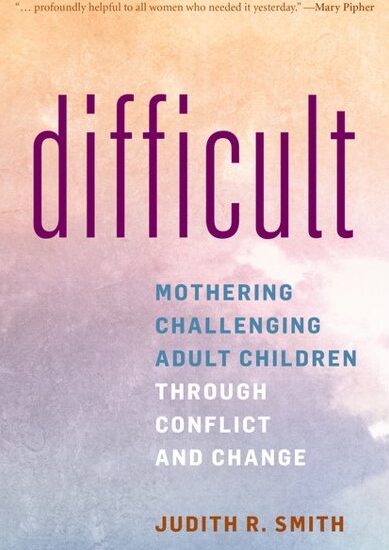
 One of the most powerful and influential tools of the modern world is the media, which can be used to spread awareness, ideas, and opinions, impacting common attitudes and policies. Now, imagine radio and television stations controlled by tens of thousands of school teachers, students, housewives, farmers, and indigenous communities. This was the historic occurrence in the non-violent uprising during the summer of 2006, in Oaxaca, Mexico. “A Little Bit of So Much Truth” is a documentary that captured this event, which occurred when the people of Oaxaca took 14 radio stations and one TV station into their own hands, using them to organize and defend their grassroots struggle for social, economic, cultural, and political justice.
One of the most powerful and influential tools of the modern world is the media, which can be used to spread awareness, ideas, and opinions, impacting common attitudes and policies. Now, imagine radio and television stations controlled by tens of thousands of school teachers, students, housewives, farmers, and indigenous communities. This was the historic occurrence in the non-violent uprising during the summer of 2006, in Oaxaca, Mexico. “A Little Bit of So Much Truth” is a documentary that captured this event, which occurred when the people of Oaxaca took 14 radio stations and one TV station into their own hands, using them to organize and defend their grassroots struggle for social, economic, cultural, and political justice.
This film begins with the atrocious conditions in Oaxaca—pollution, racism against indigenous peoples, lack of water, scarcity of food, and no security. Frustrated with their living conditions, the teachers of Oaxaca went on strike and created their own radio station, Radio Plantón, through which they expressed their discontent and opinions about needed government change, mainly the immediate resignation of their corrupt governor, Ulises Ruiz Ortiz.
The federal government retaliated against this strike, sending troops to attack the radio station. Yet, despite having trained military personnel and weapons, the federal government was unable to take control of the radio station due to civilian resistance—through the use of the radio, the people of Oaxaca were able to organize themselves and successfully resist. Soon after this initial conflict, the teachers formed the Popular Assembly of the Peoples of Oaxaca (APPO, from its Spanish name, Asamblea Popular de los Pueblos de Oaxaca.). Following several more attacks from the federal government, the APPO took over yet another radio station, Radio Universidad. The radio continually proved its importance as it saved lives by giving rapid, current information during shoot-outs and air raids. Aside from radio, the APPO also took over a government run television station because of their belief that the two main channels, TV Azteca and Televisa, were manufactoring mass opinions without truly informing viewers.
Beginning with a simple radio station in a small town, this movement turned into a seven month conflict involving the federal government and multiple states in Mexico. Whether the civilian takeover of the media was justified or not, this film highlights the impact that the media has on people. Media outlets, like the radio or television, have massive potential for any use, which can be beneficial and dangerous at the same time. Television advertisements can sell harmful drugs one second and the next present anti-smoking commercials. In order to tip the scale towards healthier information—how to fight obesity, drug addiction, human rights abuses—health professionals need to flood the mainstream media with ads. By mainstream, I mean not just television or radio, but social networking sites like Facebook, Twitter and YouTube, whose exposure exceeds that of television or radio, at no cost.
Inspired by the influence of Radio Plantón, I think more people should be involved—either by active participation or by paying attention—in the media. As proven by the influence of Radio Plantón the more informed we are, the better.
Jennifer De Jesus is a student in the Macaulay Honors College at Hunter and an avid movie watcher. She is also an employee of the Health Professions Education Center, which has one of the largest collection of health films in the New York City area.








